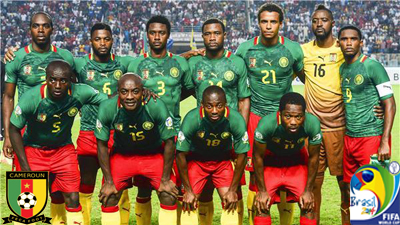Nickname: The Indomitable Lions
FIFA Ranking: 56
World Cup history: Six World Cup appearance, reaching the quarterfinals once
Once regarded as a team that could change the world’s perception of African football, Cameroon waned down and are today still battling to re-establish themselves as a powerhouse in Africa. The Indomitable Lions, as they are known, inspired hope in Africa when they became the first African team to reach the quarterfinals of the World Cup in 1990. In their opening match of the tournament, the sent shockwaves in the football fraternity when they beat defending champions, Argentina. They went on to register a 2-1 victory against Romania. They lost their final group stage to Russia 4-0. In the Round of 16, they beat Colombia to book their quarterfinal place against England.
With some of Cameroon’s great players like François Omam-Biyik, Eugène Ekéké, Roger Milla, to name but a few, Cameroon put up a much spirited performance against England. Like the Indomitable Lions, Cameroon came back from a goal down and even took the lead in the second half. However, with about seven minutes to go, England equalised and the score was 2-all at fulltime, pushing the match into extra time. England went on to convert a penalty and take the lead, eventually winning the match 3-2.
They have been drawn in a very tough group that includes Brazil and Mexico, who are fancied to advance to the Round of 16, with pundits predicting Cameroon and Croatia to bomb out of the tournament in the group stages
Even though, they failed to reach the semifinals of the tournament they returned home with their heads held high as African heroes. It was such an inspiring performance from a team that was only playing in the World Cup for the second time. The first time they had played in the tournament was in 1982 and had not lost a single match despite being new kids on the block. They had drawn all their matches, collecting three points which were, unfortunately, not good enough to see them through to the Round of 16.
But that 1990 showing was Cameroon’s last impressive showing on the world stage. They failed to get out of the group stages in 1994, 1998, 2002, and 2010.They failed to qualify for the 2006 episode. Unlike in 1982 when they didn’t lose a single match, they lost all their matches four year ago in South Africa, marking their worst World Cup performance ever.
They have four African Nations Cup titles to their name, but they failed to qualify for the last two Afcon tournaments in 2012, and 2013. But their road to Brazil was encouraging. The experience of veteran Chelsea striker, Samuel Eto’o, and defensive midfielder, Stephane Mbia’s imposing presence added a lot of strength to the Cameroonian side. They have been drawn in a very tough group that includes Brazil and Mexico, who are fancied to advance to the Round of 16, with pundits predicting Cameroon and Croatia to bomb out of the tournament in the group stages.
Key players: Samuel Eto’o, Stephane Mbia, Fabrice Olinga
Know your coach: Volker Finke
Volker Finke is a former player, who turned out for Hannoverscher SC, during his playing days. The 66-year old was born Nienburg in Germany. He spent 16 years coaching SC Freiburg before he moved to Japan to coach Urawa Red Diamonds. In 2010, he later left the club and joined FC Koln as a Technical Director and later as an interim coach.
There are concerns about his depth of experience on the world stage as he takes Cameroon to Brazil. Before his appointment as the Cameroonian he had never coached a national team before and this World Cup should be his biggest test.
Country Profile:
Cameroon is a former French colony in Central Africa. The country became independent in January 1960. The President Paul Biya celebrated 31 years in power in 2013. He has been highly criticised for failing to hand over power. His predecessor Ahmadou Ahidjo voluntarily handed the reins after ruling for 22 years but remained the head of the country’s sole political party. His resignation was however followed by a power struggle and he was also accused of plotting against the government. He was later sentenced to death while in exile.
According to the African Development Bank the country’s economy is one of the stable is stable compared to countries in the region. Cameroon’s GDP growth reached 4.9% in 2013. The country is rich with oil and agricultural products including cocoa however the government is focussing its energy on developing the latter in order to reduce its dependency on oil.
The country is the sixth largest cocoa producer.
The oil industry is regulated by the Ministry through its national oil company. The main food crops in the country include yam, cassava and bananas. Unemployment in the country is between 40-50 % and poverty is rife. Access to proper services such as water and sanitation is still a challenge. Unemployment in the country is between 40-50%.
Cameroon has a literacy rate of 68%, better compared to other countries in the region. Education is free in government schools. However quality education remains a challenge. Poor leadership, management and corruption are a course for concern in the country.
• Full name: Republic of Cameroon
• Population: 20 million (UN, 2012)
• Capital: Yaounde
• Area: 475,442 sq km (183,568 sq miles)
• Major languages: French, English, languages of Bantu, Semi-Bantu and Sudanic groups
• Major religions: Christianity, Islam, indigenous beliefs
• Life expectancy: 51 years (men), 54 years (women) (UN)
• Monetary unit: 1 CFA (Communaute Financiere Africaine) franc = 100 centimes
• Main exports: Crude oil and petroleum products, timber, cocoa, aluminium, coffee, cotton
• GNI per capita: US $1,210 (World Bank, 2011)
• Internet domain: .cm
• International dialling code: +237
– By Sipho Kekana and Lerato Matlala


